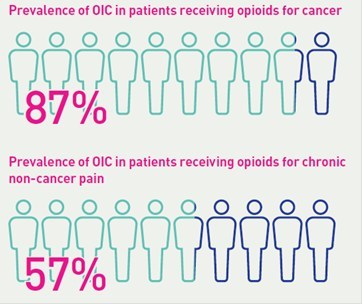- For the first time, clinicians in the UK & Ireland have access to a peer-reviewed, pragmatic guide to day-to-day clinical practice in the recognition and management of OIC
- New treatment algorithm set to change the management of OIC and improve outcomes for patients
GALASHIELS, Scotland, May 8, 2019 /PRNewswire/ -- Kyowa Kirin International PLC has announced the publication of Pathophysiology and Management of Opioid-Induced Constipation: European Expert Consensus Statement in United European Gastroenterology (UEG) Journal.[1]

The European Consensus Statement was initiated to address the barriers to Opioid-Induced Constipation (OIC) diagnosis and to develop a pragmatic, stepwise approach to OIC management. OIC is currently an under-recognised and undertreated complication of opioid therapy, occurring in 51-87% of patients receiving opioids for cancer and around half (41-57%) of patients receiving opioids for chronic non-cancer pain.[1],[2],[3]
Dr Adam Farmer, lead author of the report and Consultant Gastroenterologist, University Hospitals of North Midlands NHS Trust, said: "The consensus statement is a real step forward in our understanding of opioid-induced constipation. For the first time we have a clinically relevant paper that brings together multiple strands of knowledge and will hopefully change clinical practice in years to come."
Dr Farmer continued: "The consensus statement is important for three reasons: firstly, for the identification of Opioid-Induced constipation, secondly for assessing and managing the problem and thirdly to guide appropriate treatment."
Effective management of OIC requires early recognition but patients' reluctance to report symptoms means the condition often goes unrecognised.[4] OIC is specifically caused by opioids binding to mu-receptors in the bowel and requires different treatment to other types of constipation as over half (54%) of patients with OIC don't respond to laxatives.[4],[5] Despite the availability of other treatment options, effective management is often not instituted and as a result, almost 60% of patients with OIC reduce their pain medication due to constipation.[6]
Speaking about what the publication means for patients, Dr. Andrew Davies, Specialty Lead for Supportive & Palliative Care at the Royal Surrey County Hospital/St Luke's Cancer Centre in Guildford, United Kingdom, and President of the Association of Palliative Medicine for Great Britain and Ireland, said: "Opioid-Induced Constipation can be difficult to diagnose because patients often have a variety of different symptoms and don't necessarily associate those symptoms with either constipation or the fact that they've been started on an opioid.
"The most important thing about the consensus statement is highlighting that Opioid-Induced Constipation is a significant clinical problem that needs to be managed in a completely different way to other types of constipation and that there are new targeted treatments to manage it."
The initiative, supported and funded by Kyowa Kirin International PLC, was driven by a panel of experts from Europe, in the fields of neurogastroenterology, gastroenterology, pain medicine, palliative medicine and oncology, who conducted a focused review of the pathophysiology and a clinical evaluation of OIC, which helped form the Consensus Statement.[1]
The Consensus Statement makes specific recommendations for the management of OIC, including educating patients about the side effects of opioids, co-prescription of laxative, dietary and lifestyle modifications, asking patients about side-effects (including constipation) at every clinical review, use of opioid antagonists and evaluation of gastrointestinal physiology.
Notes to Editors
About Kyowa Kirin
Kyowa Hakko Kirin Co., Ltd. is a research-based life sciences company, with special strengths in biotechnologies. In the core therapeutic areas of oncology, nephrology and immunology/allergy, Kyowa Hakko Kirin leverages leading-edge biotechnologies centred on antibody technologies, to continually discover innovative new drugs and to develop and market those drugs worldwide. In this way, the company is working to realise its vision of becoming a Japan-based global specialty pharmaceutical company that contributes to the health and wellbeing of people around the world.
Kyowa Kirin International PLC is a wholly owned subsidiary of Kyowa Hakko Kirin and is a rapidly growing specialty pharmaceutical company engaged in the development and commercialisation of prescription medicines for the treatment of unmet therapeutic needs in Europe and the United States. Kyowa Kirin International is headquartered in Scotland.
You can learn more about the business at: https://kyowa-kirin.com/; http://www.international.kyowa-kirin.com/uk/
References:
- Farmer A, Drewes AM, Chiarioni G, et al. Pathophysiology and management of opioid-induced constipation: European expert consensus statement. United European GastroenterologyFebruary 2019; 7: 7-20. https://journals.sagepub.com/doi/full/10.1177/2050640618818305
- Tuteja AK, Biskupiak J, Stoddard GJ, et al. Opioid-induced bowel disorders and narcotic bowel syndrome in patients with chronic non-cancer pain. Neurogastroenterol Motil 2010; 22: 424-430, e496. 2010/01/27. DOI: 10.1111/j.1365-2982.2009.01458.x.
- Drewes AM, Munkholm P, Simren M, et al. Definition, diagnosis and treatment strategies for opioid-induced bowel dysfunction-Recommendations of the Nordic Working Group. Scand J Pain 2016; 11: 111-122. 2016/04/01. DOI: 10.1016/j.sjpain.2015.12.005.
- Nelson AD, Camilleri M. Ther Adv Chronic Dis 2016;7:121-34
- Pappagallo M. Incidence, prevalence, and management of opioid bowel dysfunction. The American Journal of Surgery. 2001;182(5A Suppl):11S-18S.
- Epstein R, Cimen A, Benenson H, et al. Patient preferences for change in symptoms associated with opioid-induced constipation. Advances in Therapy. 2004;31(12):1263-1271.
Contact
Media Relations and public affairs
Layla Robinson
Layla.robinson@kyowakirin.com
+44(0)7551 387346
Photo - https://mma.prnewswire.com/media/883322/Kyowa_Kirin_OIC_Infographic.jpg

